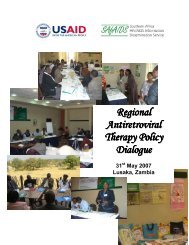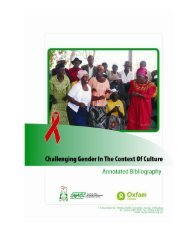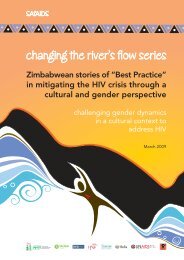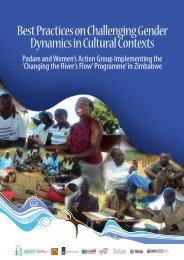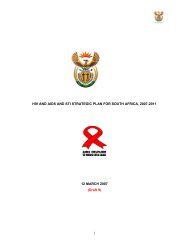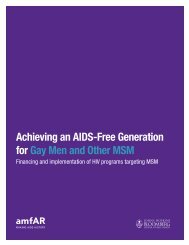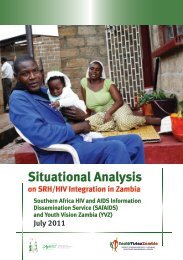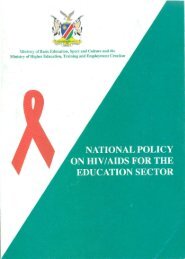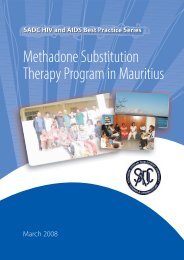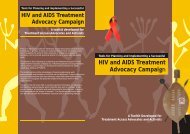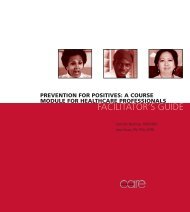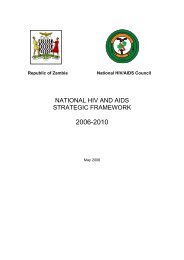Implementation of regional and international HIV prevention - SAfAIDS
Implementation of regional and international HIV prevention - SAfAIDS
Implementation of regional and international HIV prevention - SAfAIDS
- No tags were found...
You also want an ePaper? Increase the reach of your titles
YUMPU automatically turns print PDFs into web optimized ePapers that Google loves.
4.0 COMPLIANCE WITH LOCAL, REGIONALAND INTERNATIONAL LEGAL AND POLICYFRAMEWORKS4.1 National provisions for <strong>HIV</strong> <strong>and</strong> AIDS <strong>prevention</strong>, care <strong>and</strong> supportOver the years the Governments <strong>of</strong> Swazil<strong>and</strong> <strong>and</strong> Zambia have put in place legislative policies<strong>and</strong> frameworks to guide the implementation <strong>of</strong> <strong>HIV</strong> <strong>and</strong> AIDS responses in accordance withthe <strong>international</strong> conventions <strong>and</strong> declarations the countries are signatory to. Fundamentally,the crafting <strong>of</strong> these legislative policies <strong>and</strong> frameworks in the two countries was guidedby a number <strong>of</strong> principles which included political leadership <strong>and</strong> commitment; a multisectoralapproach <strong>and</strong> partnership; co-ordinated approach; greater involvement <strong>of</strong> PL<strong>HIV</strong>;decentralisation <strong>and</strong> promotion <strong>and</strong> protection <strong>of</strong> human rights, among others.Swazil<strong>and</strong> has indirect constitutional provisions for <strong>HIV</strong> <strong>prevention</strong>, care <strong>and</strong> support, such asthe right to affordable <strong>and</strong> accessible social services, including health, protection <strong>of</strong> the right tolife, rights to freedoms <strong>of</strong> women <strong>and</strong> rights <strong>of</strong> children. The national response to <strong>HIV</strong> <strong>and</strong> AIDS<strong>prevention</strong>, care <strong>and</strong> support is guided by the National Multi-sectoral <strong>HIV</strong> <strong>and</strong> AIDS Policy <strong>of</strong>2006, <strong>and</strong> before it, the Health Sector Policy on <strong>HIV</strong> <strong>and</strong> AIDS <strong>and</strong> STD Prevention <strong>and</strong> Control<strong>of</strong> 1998. Other policy <strong>and</strong> legislative provisions that guide <strong>HIV</strong> <strong>and</strong> AIDS <strong>prevention</strong>, care <strong>and</strong>support responses in Swazil<strong>and</strong> include the National Policy on Children (2003), the HealthSector Response to <strong>HIV</strong>/AIDS Plan in Swazil<strong>and</strong> 2003-2005; the Draft National Policy on ChildrenIncluding Orphans <strong>and</strong> Vulnerable Children, the National <strong>HIV</strong>/AIDS Communication Strategy forSwazil<strong>and</strong> (2004) <strong>and</strong> the Public Sector <strong>HIV</strong>/AIDS Strategic Plan 2006-2008. Swazil<strong>and</strong>’s NationalMulti-sectoral <strong>HIV</strong> <strong>and</strong> AIDS Policy (2006) document provides a framework for undertaking<strong>prevention</strong>, care <strong>and</strong> support in responding to the epidemic. The emphasis on comprehensive<strong>prevention</strong> for a heterosexually-transmitted epidemic is highlighted. This is intended to respondto evidence from the region that multiple concurrent sexual relationships in the absence <strong>of</strong>medical male circumcision <strong>and</strong> consistent condom use are the key drivers <strong>of</strong> the epidemic.Regarding care <strong>and</strong> support, the policy places emphasis on the use <strong>of</strong> antiretroviral therapyas a way <strong>of</strong> treating <strong>and</strong> managing AIDS. The policy addresses increased access <strong>and</strong> properutilisation <strong>of</strong> ART, clinical management <strong>of</strong> opportunistic infections, diagnostic testing <strong>and</strong>counselling, institutional <strong>and</strong> home-based care, <strong>and</strong> palliative care. Of importance is therecognition <strong>of</strong> the importance <strong>of</strong> traditional remedies in the fight against <strong>HIV</strong> <strong>and</strong>, theprovision <strong>of</strong> nutrition <strong>and</strong> mental health services.26



